人教新目标英语八年级上册Unit 7 Will people have robots?全单元导学案(6课时无答案)
文档属性
| 名称 | 人教新目标英语八年级上册Unit 7 Will people have robots?全单元导学案(6课时无答案) | 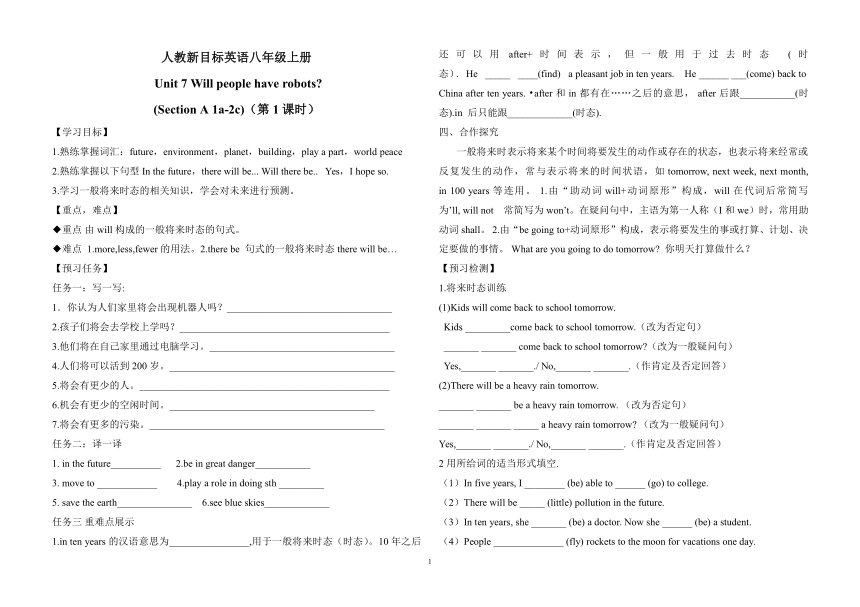 | |
| 格式 | zip | ||
| 文件大小 | 75.0KB | ||
| 资源类型 | 教案 | ||
| 版本资源 | 人教新目标(Go for it)版 | ||
| 科目 | 英语 | ||
| 更新时间 | 2020-07-06 21:31:25 | ||
图片预览

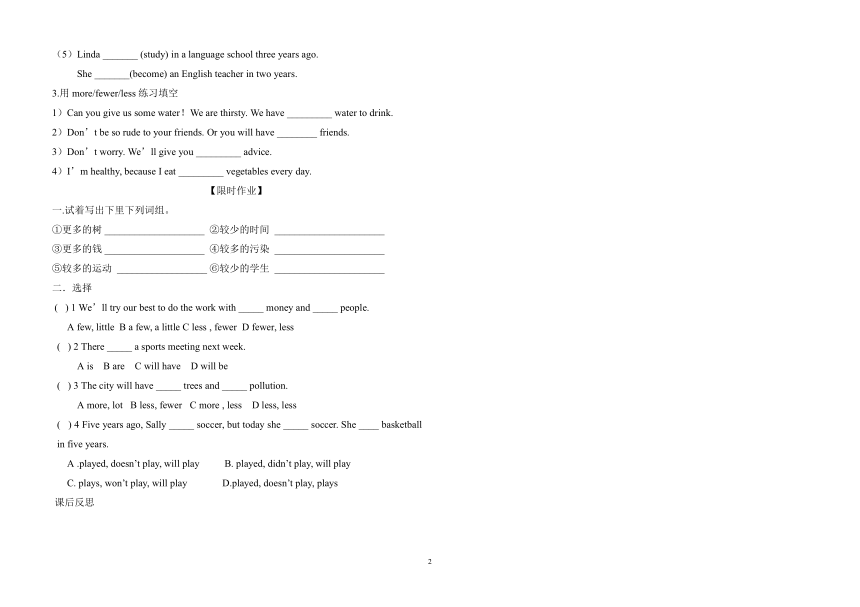
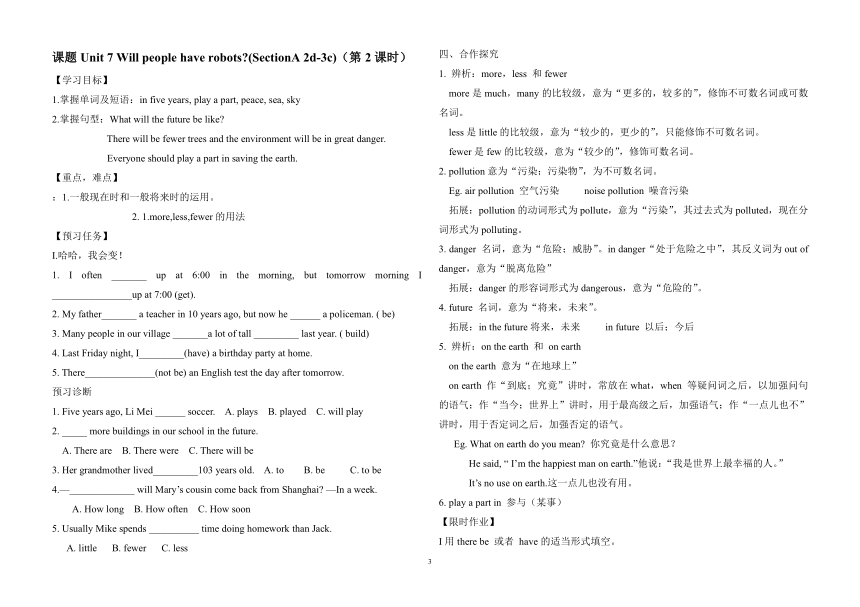
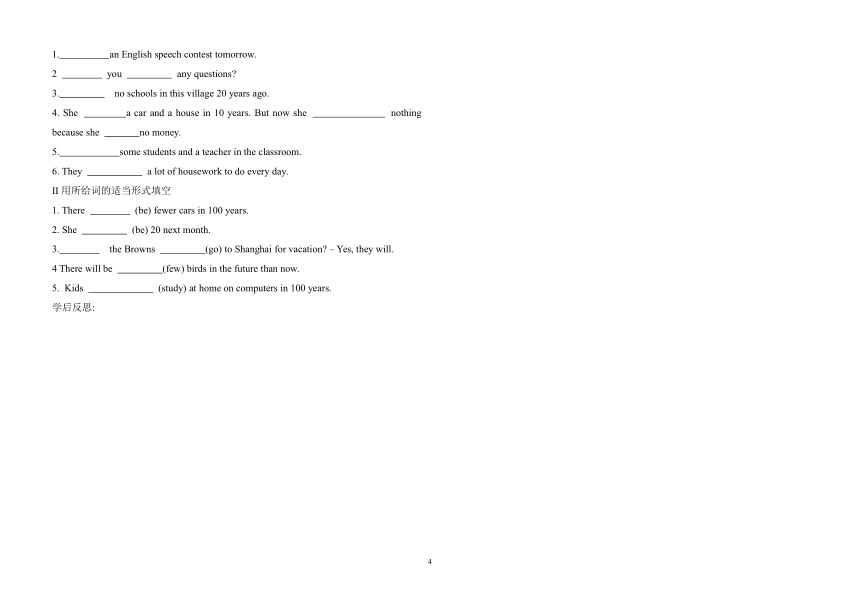
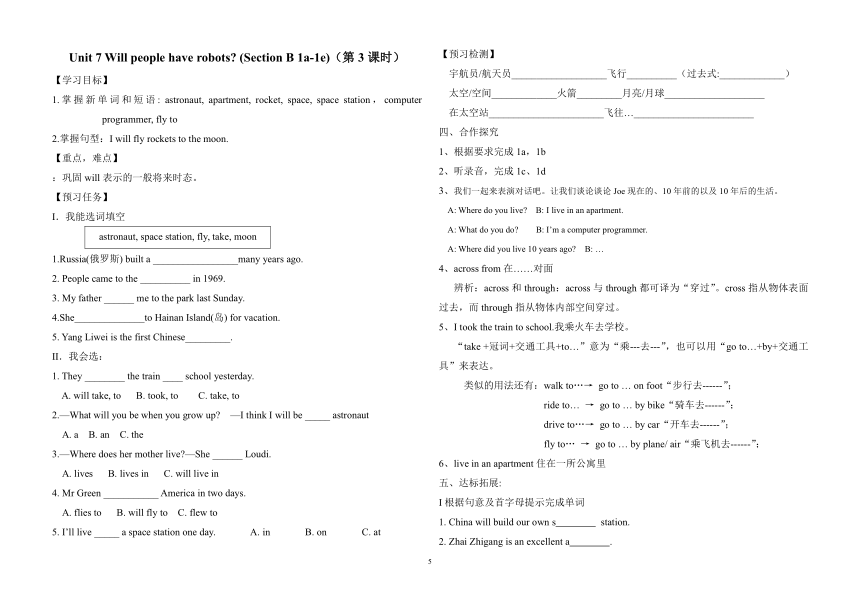
文档简介
人教新目标英语八年级上册
?Unit?7?Will?people?have?robots?
(Section?A?1a-2c)(第1课时)
【学习目标】
1.熟练掌握词汇:future,environment,planet,building,play?a?part,world?peace?
2.熟练掌握以下句型In?the?future,there?will?be...
Will?there?be..?
Yes,I?hope?so.?
3.学习一般将来时态的相关知识,学会对未来进行预测。
【重点,难点】
◆重点?由will构成的一般将来时态的句式。
◆难点
1.more,less,fewer的用法。2.there
be
句式的一般将来时态there
will
be…
【预习任务】
任务一:写一写:?
1.你认为人们家里将会出现机器人吗?_________________________________?
2.孩子们将会去学校上学吗?__________________________________________?
3.他们将在自己家里通过电脑学习。_____________________________________?
4.人们将可以活到200岁。_____________________________________________?
5.将会有更少的人。__________________________________________________?
6.机会有更少的空闲时间。_________________________________________?
7.将会有更多的污染。_______________________________________________?
任务二:译一译
1.
in
the?future__________??????2.be?in?great?danger___________?
3.
move?to?____________????????4.play?a?role?in?doing?sth?_________?
5.
save?the?earth_______________
6.see?blue?skies_____________?
任务三?重难点展示
1.in?ten?years的汉语意思为________________,用于一般将来时态(时态)。10年之后还可以用after+时间表示,但一般用于过去时态
(时态).???He
?_____
?____(find)?
a?pleasant?job?in?ten?years.????He?______?___(come)?back?to?China?after?ten?years.??after?和in?都有在……之后的意思,?after后跟___________(时态).in??后只能跟_____________(时态).??
四、合作探究
???一般将来时表示将来某个时间将要发生的动作或存在的状态,也表示将来经常或反复发生的动作,常与表示将来的时间状语,如tomorrow,?next?week,?next?month,
in?100?years等连用。?1.由“助动词will+动词原形”构成,will在代词后常简写为’ll,?will?not????常简写为won’t。在疑问句中,主语为第一人称(I和we)时,常用助动词shall。?2.由“be?going?to+动词原形”构成,表示将要发生的事或打算、计划、决定要做的事情。?What?are?you?going?to?do?tomorrow?
你明天打算做什么??
【预习检测】
1.将来时态训练?
(1)Kids?will?come?back?to?school?tomorrow.?
??Kids?_________come?back?to?school?tomorrow.(改为否定句)?
_______?_______?come?back?to?school?tomorrow?(改为一般疑问句)??
Yes,_______?_______./?No,_______?_______.(作肯定及否定回答)
(2)There?will?be?a?heavy?rain?tomorrow.?
_______?_______?be?a?heavy?rain?tomorrow.?(改为否定句)?
_______?_______?_____?a?heavy?rain?tomorrow??(改为一般疑问句)?
Yes,_______?_______./?No,_______?_______.(作肯定及否定回答)?
2用所给词的适当形式填空.?
(1)In?five?years,?I?________?(be)?able?to?______?(go)?to?college.?
(2)There?will?be?_____?(little)?pollution?in?the?future.?
(3)In?ten?years,?she?_______?(be)?a?doctor.?Now?she?______?(be)?a?student.?
(4)People?______________?(fly)?rockets?to?the?moon?for?vacations?one?day.?
(5)Linda?_______?(study)?in?a?language?school?three?years?ago.
She?_______(become)?an?English?teacher?in?two?years.?
3.用more/fewer/less?练习填空?
1)Can?you?give?us?some?water!We?are?thirsty.?We?have?_________?water?to?drink.?
2)Don’t?be?so?rude?to?your?friends.?Or?you?will?have?________?friends.?
3)Don’t?worry.?We’ll?give?you?_________?advice.?
4)I’m?healthy,?because?I?eat?_________?vegetables?every?day.?
【限时作业】
一.试着写出下里下列词组。?
①更多的树?____________________??②较少的时间??______________________?
③更多的钱?____________________??④较多的污染??______________________?
⑤较多的运动??__________________?⑥较少的学生??______________________?
二.选择
?(???)?1?We’ll?try?our?best?to?do?the?work?with?_____?money?and?_____?people.??
A?few,?little??B?a?few,?a?little?C?less?,?fewer??D?fewer,?less
(???)?2?There?_____?a?sports?meeting?next?week.??
A?is????B?are????C?will?have????D?will?be?
(???)?3?The?city?will?have?_____?trees?and?_____?pollution.??????
A?more,?lot???B?less,?fewer???C?more?,?less????D?less,?less?
(???)?4?Five?years?ago,?Sally?_____?soccer,?but?today?she?_____?soccer.?She?____?basketballin?five?years.??????
A?.played,?doesn’t?play,?will?play??????????B.?played,?didn’t?play,?will?play????????
???
?C.?plays,?won’t?play,?will?play????????????
D.played,?doesn’t?play,?plays
?课后反思
??
课题?Unit?7?Will?people?have?robots?(SectionA?2d-3c)(第2课时)
【学习目标】
1.掌握单词及短语:in
five
years,
play
a
part,
peace,
sea,
sky
2.掌握句型:What
will
the
future
be
like?
There
will
be
fewer
trees
and
the
environment
will
be
in
great
danger.
Everyone
should
play
a
part
in
saving
the
earth.
【重点,难点】
:1.一般现在时和一般将来时的运用。
2.
1.more,less,fewer的用法
【预习任务】
I.哈哈,我会变!
1.
I
often
_______
up
at
6:00
in
the
morning,
but
tomorrow
morning
I
________________up
at
7:00
(get).
2.
My
father_______
a
teacher
in
10
years
ago,
but
now
he
______
a
policeman.
(
be)
3.
Many
people
in
our
village
_______a
lot
of
tall
_________
last
year.
(
build)
4.
Last
Friday
night,
I_________(have)
a
birthday
party
at
home.
5.
There______________(not
be)
an
English
test
the
day
after
tomorrow.
预习诊断
1.
Five
years
ago,
Li
Mei
______
soccer.
A.
plays
B.
played
C.
will
play
2.
_____
more
buildings
in
our
school
in
the
future.
A.
There
are
B.
There
were
C.
There
will
be
3.
Her
grandmother
lived_________103
years
old.
A.
to
B.
be
C.
to
be
4.—_____________
will
Mary’s
cousin
come
back
from
Shanghai?
—In
a
week.
A.
How
long
B.
How
often
C.
How
soon
5.
Usually
Mike
spends
__________
time
doing
homework
than
Jack.
A.
little
B.
fewer
C.
less
四、合作探究
1.
辨析:more,less
和fewer
more是much,many的比较级,意为“更多的,较多的”,修饰不可数名词或可数名词。
less是little的比较级,意为“较少的,更少的”,只能修饰不可数名词。
fewer是few的比较级,意为“较少的”,修饰可数名词。
2.
pollution意为“污染;污染物”,为不可数名词。
Eg.
air
pollution
空气污染
noise
pollution
噪音污染
拓展:pollution的动词形式为pollute,意为“污染”,其过去式为polluted,现在分词形式为polluting。
3.
danger
名词,意为“危险;威胁”。in
danger“处于危险之中”,其反义词为out
of
danger,意为“脱离危险”
拓展:danger的形容词形式为dangerous,意为“危险的”。
4.
future
名词,意为“将来,未来”。
拓展:in
the
future将来,未来
in
future
以后;今后
5.
辨析:on
the
earth
和
on
earth
on
the
earth
意为“在地球上”
on
earth
作“到底;究竟”讲时,常放在what,when
等疑问词之后,以加强问句的语气;作“当今;世界上”讲时,用于最高级之后,加强语气;作“一点儿也不”讲时,用于否定词之后,加强否定的语气。
Eg.
What
on
earth
do
you
mean?
你究竟是什么意思?
He
said,
“
I’m
the
happiest
man
on
earth.”他说:“我是世界上最幸福的人。”
It’s
no
use
on
earth.这一点儿也没有用。
6.
play
a
part
in
参与(某事)
【限时作业】
I用there
be
或者
have的适当形式填空。
1.
an
English
speech
contest
tomorrow.
2
you
any
questions?
3.
no
schools
in
this
village
20
years
ago.
4.
She
a
car
and
a
house
in
10
years.
But
now
she
nothing
because
she
no
money.
5.
some
students
and
a
teacher
in
the
classroom.
6.
They
a
lot
of
housework
to
do
every
day.
II用所给词的适当形式填空
1.
There
(be)
fewer
cars
in
100
years.
2.
She
(be)
20
next
month.
3.
the
Browns
(go)
to
Shanghai
for
vacation?
–
Yes,
they
will.
4
There
will
be
(few)
birds
in
the
future
than
now.
5.
Kids
(study)
at
home
on
computers
in
100
years.
学后反思:
Unit
7
Will
people
have
robots?
(Section
B
1a-1e)(第3课时)
【学习目标】
1.掌握新单词和短语:
astronaut,
apartment,
rocket,
space,
space
station,computer
programmer,
fly
to
2.掌握句型:I
will
fly
rockets
to
the
moon.
【重点,难点】
:巩固will表示的一般将来时态。
【预习任务】
I.我能选词填空
astronaut,
space
station,
fly,
take,
moon
1.Russia(俄罗斯)
built
a
_________________many
years
ago.
2.
People
came
to
the
__________
in
1969.
3.
My
father
______
me
to
the
park
last
Sunday.
4.She______________to
Hainan
Island(岛)
for
vacation.
5.
Yang
Liwei
is
the
first
Chinese_________.
II.我会选:
1.
They
________
the
train
____
school
yesterday.
A.
will
take,
to
B.
took,
to
C.
take,
to
2.—What
will
you
be
when
you
grow
up?
—I
think
I
will
be
_____
astronaut
A.
a
B.
an
C.
the
3.—Where
does
her
mother
live?—She
______
Loudi.
A.
lives
B.
lives
in
C.
will
live
in
4.
Mr
Green
___________
America
in
two
days.
A.
flies
to
B.
will
fly
to
C.
flew
to
5.
I’ll
live
_____
a
space
station
one
day.
A.
in
B.
on
C.
at
【预习检测】
宇航员/航天员___________________飞行__________(过去式:_____________)
太空/空间_____________火箭_________月亮/月球____________________
在太空站_______________________飞往…________________________
四、合作探究
1、根据要求完成1a,1b
2、听录音,完成1c、1d
3、我们一起来表演对话吧。让我们谈论谈论Joe现在的、10年前的以及10年后的生活。
A:
Where
do
you
live?
B:
I
live
in
an
apartment.
A:
What
do
you
do?
B:
I’m
a
computer
programmer.
A:
Where
did
you
live
10
years
ago?
B:
…
4、across
from在……对面
辨析:across和through:across与through都可译为“穿过”。cross指从物体表面过去,而through指从物体内部空间穿过。
5、I
took
the
train
to
school.我乘火车去学校。
“take
+冠词+交通工具+to…”意为“乘---去---”,也可以用“go
to…+by+交通工具”来表达。
类似的用法还有:walk
to…→
go
to
…
on
foot“步行去------”;
ride
to…
→
go
to
…
by
bike“骑车去------”;
drive
to…→
go
to
…
by
car“开车去------”;
fly
to…
→
go
to
…
by
plane/
air“乘飞机去------”;
6、live
in
an
apartment住在一所公寓里
五、达标拓展:
I根据句意及首字母提示完成单词
1.
China
will
build
our
own
s
station.
2.
Zhai
Zhigang
is
an
excellent
a
.
3.
People
will
visit
other
planets
by
r
.
4.
Tomorrow
I
will
f
to
Beijing
and
have
a
meeting.
5.
The
m
goes
round
the
earth.
II.用所给词的适当形式填空
1.
He
(live)in
Weihai
two
years
ago.
2.
There
(be)
an
English
test
next
Wednesday.
3.
There
are
many
beautiful
(build)
in
Harbin.
4.
I
(take)
the
bus
to
school
yesterday.
5.
I
(work)
near
here.
III.用所给动词适当形式填空
1.
What
_________
you
______(do)
this
Sunday?
There
__________(be)
a
football
match.
2.
He
swimming
in
the
river
every
day
in
summer.
(go)
3.
“
When
you
the
car
?”
(buy)
“
In
1998
.
”
4.
Mary’s
birthday
is
next
Monday,
Her
mother
___________(give)her
a
present.
5.
They
all
_________(go)
to
the
mountains
yesterday
morning.
6.
She
_________(not
visit)
her
aunt
last
weekend.
She
____
(stay)
at
home
and
______(do)
some
cleaning.
学后反思:
Unit
7
Will
people
have
robots?
(Section
B
2a-2e)(第4课时)
【学习目标】
(Reading)
1.掌握新单词,短语:
human,
servant,
dangerous,
already,
factory,
believe,
disagree,
shape,
possible,
impossible,
side,
in
the
future,
hundreds
of,
help
with,
help
(to)do…,make…do…,
the
same
as,
over
and
over
again
2.掌握句型:
Some
scientists
believe
that
there
will
be
such
robots
in
the
future.
For
example,
there
are
already
robots
working
in
factories.
That
may
not
seem
possible
now,
but
computers,
space
rockets
and
even
electric
tooth
brushes
seemed
impossible
a
hundred
years
ago.
It’s
easy
for
a
child
to
wake
up.
【重点,难点】
学会使用will来作预测
【预习任务】
unpleasant(反义词)_____________made(原形)
_______scientist(科学________)
factory(pl.)__________human(pl.)________
未来,将来
bored(v.)___________(adj.)_______________
帮助做某事_________________________
一再;反复
看起来像
醒来;唤醒
the
same
as
get
bored
seem
possible
(1)They
_________
_____________(帮助)the
housework
and
do
the
most
unpleasant
jobs.
(2)However,
they
agree
it
may
take_________
________(数百年)years.
(3)Scientists
are
now
trying
to
make
robots__________
___________(看起来像)people
and
do______
__________
_____(与…相同)us.
(4)
After
an
earthquake,a
snake
robot
could
help_________
_________(寻找)people
under
buildings
(5)We
never
know
what
will
happen_______
______
___________(未来).
四、合作探究:(Reading)
Task
1
Read
and
answer
(1)Do
you
think
you
will
have
your
own
robots?_
(2)What
can
the
robots
in
the
future
do?
(3)What
are
scientists
trying
to
do
now?
(4)Are
there
already
robots
working
in
factories?
___
(5)What
could
a
snake
robot
do
after
an
earthquake?
Task
2
Read
and
fill
in
the
chart.
知识拓展:
(1)For
example,
there
are
already
robots
working
in
factories.
例如,已有一部分机器人在工厂里工作了。
本句含有固定句型:There
is/
are
+sb./
sth.
+doing
sth.
表示“有某人/某物在做某事”。
Eg.There
are
some
boys
swimming
in
the
swimming
pool.
有一些男孩在游泳池里游泳。
(2)That
may
not
seem
possible
now,
but
computers,
space
rockets
and
even
electric
Tooth
brushes
seemed
impossible
a
hundred
years
ago.
现在看起来似乎是不可能的,但在100年之前,电脑、宇宙火箭甚至电动牙刷似乎也是不可能的。
本句是由but连接的并列句。
seem
v.
像是;似乎
观察例句,领悟seem的用法:
1.
Lucy
seems
quite
happy.
露西似乎很高兴。
2.
It
seems
a
good
idea.
似乎是一个好主意。
3.
Group
2
seemed
to
win
the
match.
二组好像赢了比赛。
4.
It
seems
that
he
was
ill.
似乎他病了。
possible
adj.可能存在或发生的,可能的。反义词为impossible
as
……
as
possible
尽可能地,……
eg.
as
soon
as
possible
尽可能快(指时间)
as
fast
as
possible
尽可能快(指速度)
as
quickly
as
possible
尽可能快(指动作)
【限时作业】
一.用所给词的适当形式填空
1.
He
(live)
in
Weihai
two
years
ago.
2.
There
(be)
an
English
test
next
Wednesday.
3.
There
are
many
beautiful
(build)
in
Harbin.
4.
I
(take)
the
bus
to
school
yesterday.
5.
I
(work)
near
here.
二用所给动词适当形式填空
1.
What
_______
you
______(do)
this
Sunday?
There
__________(be)
a
football
match.
2.
He
swimming
in
the
river
every
day
in
summer.
(go)
3.
“
When
you
the
car
?”
(
buy
)
“
In
1998
.
”
4.
Mary’s
birthday
is
next
Monday,
Her
mother
___________(give)her
a
present.
5.
They
all
_________(go)
to
the
mountains
yesterday
morning.
6.
She
_________(not
visit)
her
aunt
last
weekend.
She
____
(stay)
at
home
and
______(do)
some
cleaning.
学后反思:
Unit
7
Will
people
have
robots?(Section
B
3a-4)(第5课时)
一、学习目标:
1.掌握单词和短语:probably,
during,
holiday,
world,
lots
of,
be
good
for,
be
comfortable,
during
the
week,
on
the
weekend
2.理解一般将来时在文章中的运用,学会分析文章结构和句子。
3.大胆推测自己十年后的生活,会用英语表达。
【重点,难点】
能正确运用一般将来时表达个人想法.
【预习任务】
1.牢记新词和短语,完成以下句子
1)
He
will
p________
forget
to
have
lunch,
because
he
is
so
busy.
2)
He
want
to
be
a
r_______.
3)
I
w______
to
my
mother
last
night,
because
I
missed
her
very
much.
4)Look!They
are
f_______
kites
happily.
5)
W_______
one
do
you
like
beat?
2.完成句子
我希望你的梦想能够实现。
I
hope
your
dream
can
.
预测未来很难。
can
be
difficult..
我有很多朋友。????____________________________________________
3.仔细阅读3a,找出以下短语和句子。
作为一名新闻记者____________________独自居住______________
养只宠物鸟______________
在周末__________________
在工作日_________________
穿正装_________________
在将来_________________
能够穿着更随意___________________
二十年后___________________
四、合作探究:
Task
1
Read
and
finish3a
完成3a,并背诵记忆
Task
2知识拓展:
(1)I’ll
live
in
Shanghai,
because
there
will
be
more
jobs
in
that
city.
我将住在上海,因为那里有更多的工作机会。(原因状语从句)
(2)During
the
week,
I’ll
wear
smart
clothes.
在工作日,我将会穿正装。
during
the
week
在工作日
on
the
weekend
在周末
(3)probably
副词,意为“或许;大概”。常用作状语,可位于句首,也可位于句中,即实义动词之前,助动词、情态动词或连系动词之后。
(4)take
a
holiday
度假;休假
(5)during
介词,意为“在……期间”。一般所指的时间长度明确。也常指某一特定活动的时间,表示某动作在这一特定的时间内发生,时间段前常用限定词the或物主代词等。
五、课堂检测
I轻松选择
1.
The
child
isn’t
old
enough
to
______
himself.
A.
wear
B.
put
on
C.
dress
2
..—Who’s
that
boy?—___________boy
?—The
one
on
the
bike.
A.Who
B.What
C.Which
3.
This
kind
of
T-shirt
looks
___
and
sells
___
in
the
market.
A.
nice;
good
B.
well;
well
C.
nice;
well
D.
good;
nice
4.
My
mother
___
very
young,
though
she
is
fifty
years
old.
A.
looks
B.
sees
C.
was
D.
sounds
5.
Please
look
___
the
blackboard.
A.
for
B.
at
C.
out
of
D.
to
6.
It
is
very
cold.
You’d
better
___
your
coat
now.
A.
dress
B.
put
on
C.
be
in
D.
wear
7.
Today
he
is
___
in
a
blue
coat.
A.
dressing
B.
dressed
C.
wearing
D.
putting
8.
Mrs.
Green
___
up
and
went
to
the
party
last
night.
A.
dressed
B.
wore
C.
put
二与一般现在时,一般过去时,现在进行时的区别。
1.
I
_____
(be)
a
little
kid
ten
years
ago.
I
_____
(be)
a
middle
school
student
now.
I
_____(be)
a
college
student
in
five
years.
2.
She______
(not
have
)
a
pet
parrot
five
years
ago.
She
_____(
have)
a
parrot
now.
She
______
(have
)
a
car
in
five
years
3.
People
will
live
to
be
100
years
old
in
100
years.(划线提问)
________________________________
学后反思:
Unit
7
Will
people
have
robots?(Self-check)(第6课时)
1、
语法------一般将来时
Group
work:观察总结一般将来时用法
1.
I
will
help
my
mother
do
the
housework
tomorrow.
2.
---
Will
your
parents
go
to
Paris
next
month?
---
Yes,
they
will./
No,
they
won’t.
3.
Kate
is
going
to
swim
tomorrow
afternoon.
4.
Tom
is
visiting
his
grandparents
next
weekend.
5.
There
will
be
more
trees
in
the
future.
一般将来时态表示将来某个时间要发生的动作或存在的状态。上面五个句子都含有将来的含义,请大家一起来归纳其特点并将下列总结补充完整。
1、一般将来时态的构成:
主语+
___+动词原形+表示________的时间状语。
2、一般将来时态的一般疑问句:______+主语+__________+表示将来的时间状语?
肯定回答:Yes,
主语+________.
否定回答:No,
主语+________.
3、表示将来意义的形式还有:be
going
to
+__________+表示将来的时间状语。
4、_________时态
+
表示将来的时间状语也可以表示将来。
5、There
be
句型的一般将来时态的结构:there
+
______
+
be
+
名词。如例句5。
there
be
句型的一般将来时的构成是“there
will
be+主语+其他”,意为“将会有…”.
其一般疑问句形式为“Will
there
be
+主语+其他?”肯定回答为:Yes,there
will.
否定回答为:No,there
won’t.
句子的否定形式是在will后加not,即“There
won’t
be
+主语+其他”,意为“将不会有……”
6、常见的表示将来的时间状语有:_______,
__________,
__________,__________...
练习:用所给单词的适当形式填空。
1.
Alex
_____
______(play)
baseball
with
me
this
afternoon.
2.
We
_______
_____
(get)
up
early
tomorrow
morning.
3.
There
____
_____
(is)
an
English
test
next
Tuesday.
4.
Books
will
only
___________
(are)
on
computers,
not
on
paper.
将上述句子改成否定句:
1.____________________________________________________
2.____________________________________________________
3.____________________________________________________
4.____________________________________________________
将上述句子改成一般疑问句:
1.____________________________________________________
2.____________________________________________________
3.____________________________________________________
4.____________________________________________________
试翻译下列句子.
1、人们将不再使用钱。
______________________________________________
2、人们家里将会有机器人。_______________________________________
3、城市将会很大而且拥挤不堪。______________________________________
4、我将要成为一名医生。________________________________________
5、将来树会更少吗?______________________________________________
二、本单元常出现的句型:
1.
There
will
be
more
pollution.
And
there
will
be
fewer
trees.
2.
People
will
live
to
be
200
years
old.
3.
People
will
have
robots
in
their
homes.
4.
I
think
there
will
be
……
5.
In
20
years,
I
think
I’ll
be
a(n)
…
I’ll
live
in
…
6.
As
a(n)
…
,
I
will
…
三、重点短语
免费的,有空的__________________活到500岁__________________
在20年以后__________________
参与(某事)__________________
在地球上__________________
到底,究竟____________________________
处于危险之中__________________
住在一所公寓里__________________
飞往__________________
在太空__________________
我相信__________________
多次,反复地__________________
变得厌烦_______________
能够__________________醒来__________________
数以百计的__________________
尽可能快__________________
四、作文
以“预测未来生活”为话题,围绕这一话题谈论未来生活会是什么样,介绍未来生活状况。应用一般将来时态,对某一话题展开充分的、合理的想象,同时也可用比较级结构,增强与现在的对比效果。常见的预测未来的话题有:机器人、电脑、环境、旅行、学习、工作等。
1
?Unit?7?Will?people?have?robots?
(Section?A?1a-2c)(第1课时)
【学习目标】
1.熟练掌握词汇:future,environment,planet,building,play?a?part,world?peace?
2.熟练掌握以下句型In?the?future,there?will?be...
Will?there?be..?
Yes,I?hope?so.?
3.学习一般将来时态的相关知识,学会对未来进行预测。
【重点,难点】
◆重点?由will构成的一般将来时态的句式。
◆难点
1.more,less,fewer的用法。2.there
be
句式的一般将来时态there
will
be…
【预习任务】
任务一:写一写:?
1.你认为人们家里将会出现机器人吗?_________________________________?
2.孩子们将会去学校上学吗?__________________________________________?
3.他们将在自己家里通过电脑学习。_____________________________________?
4.人们将可以活到200岁。_____________________________________________?
5.将会有更少的人。__________________________________________________?
6.机会有更少的空闲时间。_________________________________________?
7.将会有更多的污染。_______________________________________________?
任务二:译一译
1.
in
the?future__________??????2.be?in?great?danger___________?
3.
move?to?____________????????4.play?a?role?in?doing?sth?_________?
5.
save?the?earth_______________
6.see?blue?skies_____________?
任务三?重难点展示
1.in?ten?years的汉语意思为________________,用于一般将来时态(时态)。10年之后还可以用after+时间表示,但一般用于过去时态
(时态).???He
?_____
?____(find)?
a?pleasant?job?in?ten?years.????He?______?___(come)?back?to?China?after?ten?years.??after?和in?都有在……之后的意思,?after后跟___________(时态).in??后只能跟_____________(时态).??
四、合作探究
???一般将来时表示将来某个时间将要发生的动作或存在的状态,也表示将来经常或反复发生的动作,常与表示将来的时间状语,如tomorrow,?next?week,?next?month,
in?100?years等连用。?1.由“助动词will+动词原形”构成,will在代词后常简写为’ll,?will?not????常简写为won’t。在疑问句中,主语为第一人称(I和we)时,常用助动词shall。?2.由“be?going?to+动词原形”构成,表示将要发生的事或打算、计划、决定要做的事情。?What?are?you?going?to?do?tomorrow?
你明天打算做什么??
【预习检测】
1.将来时态训练?
(1)Kids?will?come?back?to?school?tomorrow.?
??Kids?_________come?back?to?school?tomorrow.(改为否定句)?
_______?_______?come?back?to?school?tomorrow?(改为一般疑问句)??
Yes,_______?_______./?No,_______?_______.(作肯定及否定回答)
(2)There?will?be?a?heavy?rain?tomorrow.?
_______?_______?be?a?heavy?rain?tomorrow.?(改为否定句)?
_______?_______?_____?a?heavy?rain?tomorrow??(改为一般疑问句)?
Yes,_______?_______./?No,_______?_______.(作肯定及否定回答)?
2用所给词的适当形式填空.?
(1)In?five?years,?I?________?(be)?able?to?______?(go)?to?college.?
(2)There?will?be?_____?(little)?pollution?in?the?future.?
(3)In?ten?years,?she?_______?(be)?a?doctor.?Now?she?______?(be)?a?student.?
(4)People?______________?(fly)?rockets?to?the?moon?for?vacations?one?day.?
(5)Linda?_______?(study)?in?a?language?school?three?years?ago.
She?_______(become)?an?English?teacher?in?two?years.?
3.用more/fewer/less?练习填空?
1)Can?you?give?us?some?water!We?are?thirsty.?We?have?_________?water?to?drink.?
2)Don’t?be?so?rude?to?your?friends.?Or?you?will?have?________?friends.?
3)Don’t?worry.?We’ll?give?you?_________?advice.?
4)I’m?healthy,?because?I?eat?_________?vegetables?every?day.?
【限时作业】
一.试着写出下里下列词组。?
①更多的树?____________________??②较少的时间??______________________?
③更多的钱?____________________??④较多的污染??______________________?
⑤较多的运动??__________________?⑥较少的学生??______________________?
二.选择
?(???)?1?We’ll?try?our?best?to?do?the?work?with?_____?money?and?_____?people.??
A?few,?little??B?a?few,?a?little?C?less?,?fewer??D?fewer,?less
(???)?2?There?_____?a?sports?meeting?next?week.??
A?is????B?are????C?will?have????D?will?be?
(???)?3?The?city?will?have?_____?trees?and?_____?pollution.??????
A?more,?lot???B?less,?fewer???C?more?,?less????D?less,?less?
(???)?4?Five?years?ago,?Sally?_____?soccer,?but?today?she?_____?soccer.?She?____?basketballin?five?years.??????
A?.played,?doesn’t?play,?will?play??????????B.?played,?didn’t?play,?will?play????????
???
?C.?plays,?won’t?play,?will?play????????????
D.played,?doesn’t?play,?plays
?课后反思
??
课题?Unit?7?Will?people?have?robots?(SectionA?2d-3c)(第2课时)
【学习目标】
1.掌握单词及短语:in
five
years,
play
a
part,
peace,
sea,
sky
2.掌握句型:What
will
the
future
be
like?
There
will
be
fewer
trees
and
the
environment
will
be
in
great
danger.
Everyone
should
play
a
part
in
saving
the
earth.
【重点,难点】
:1.一般现在时和一般将来时的运用。
2.
1.more,less,fewer的用法
【预习任务】
I.哈哈,我会变!
1.
I
often
_______
up
at
6:00
in
the
morning,
but
tomorrow
morning
I
________________up
at
7:00
(get).
2.
My
father_______
a
teacher
in
10
years
ago,
but
now
he
______
a
policeman.
(
be)
3.
Many
people
in
our
village
_______a
lot
of
tall
_________
last
year.
(
build)
4.
Last
Friday
night,
I_________(have)
a
birthday
party
at
home.
5.
There______________(not
be)
an
English
test
the
day
after
tomorrow.
预习诊断
1.
Five
years
ago,
Li
Mei
______
soccer.
A.
plays
B.
played
C.
will
play
2.
_____
more
buildings
in
our
school
in
the
future.
A.
There
are
B.
There
were
C.
There
will
be
3.
Her
grandmother
lived_________103
years
old.
A.
to
B.
be
C.
to
be
4.—_____________
will
Mary’s
cousin
come
back
from
Shanghai?
—In
a
week.
A.
How
long
B.
How
often
C.
How
soon
5.
Usually
Mike
spends
__________
time
doing
homework
than
Jack.
A.
little
B.
fewer
C.
less
四、合作探究
1.
辨析:more,less
和fewer
more是much,many的比较级,意为“更多的,较多的”,修饰不可数名词或可数名词。
less是little的比较级,意为“较少的,更少的”,只能修饰不可数名词。
fewer是few的比较级,意为“较少的”,修饰可数名词。
2.
pollution意为“污染;污染物”,为不可数名词。
Eg.
air
pollution
空气污染
noise
pollution
噪音污染
拓展:pollution的动词形式为pollute,意为“污染”,其过去式为polluted,现在分词形式为polluting。
3.
danger
名词,意为“危险;威胁”。in
danger“处于危险之中”,其反义词为out
of
danger,意为“脱离危险”
拓展:danger的形容词形式为dangerous,意为“危险的”。
4.
future
名词,意为“将来,未来”。
拓展:in
the
future将来,未来
in
future
以后;今后
5.
辨析:on
the
earth
和
on
earth
on
the
earth
意为“在地球上”
on
earth
作“到底;究竟”讲时,常放在what,when
等疑问词之后,以加强问句的语气;作“当今;世界上”讲时,用于最高级之后,加强语气;作“一点儿也不”讲时,用于否定词之后,加强否定的语气。
Eg.
What
on
earth
do
you
mean?
你究竟是什么意思?
He
said,
“
I’m
the
happiest
man
on
earth.”他说:“我是世界上最幸福的人。”
It’s
no
use
on
earth.这一点儿也没有用。
6.
play
a
part
in
参与(某事)
【限时作业】
I用there
be
或者
have的适当形式填空。
1.
an
English
speech
contest
tomorrow.
2
you
any
questions?
3.
no
schools
in
this
village
20
years
ago.
4.
She
a
car
and
a
house
in
10
years.
But
now
she
nothing
because
she
no
money.
5.
some
students
and
a
teacher
in
the
classroom.
6.
They
a
lot
of
housework
to
do
every
day.
II用所给词的适当形式填空
1.
There
(be)
fewer
cars
in
100
years.
2.
She
(be)
20
next
month.
3.
the
Browns
(go)
to
Shanghai
for
vacation?
–
Yes,
they
will.
4
There
will
be
(few)
birds
in
the
future
than
now.
5.
Kids
(study)
at
home
on
computers
in
100
years.
学后反思:
Unit
7
Will
people
have
robots?
(Section
B
1a-1e)(第3课时)
【学习目标】
1.掌握新单词和短语:
astronaut,
apartment,
rocket,
space,
space
station,computer
programmer,
fly
to
2.掌握句型:I
will
fly
rockets
to
the
moon.
【重点,难点】
:巩固will表示的一般将来时态。
【预习任务】
I.我能选词填空
astronaut,
space
station,
fly,
take,
moon
1.Russia(俄罗斯)
built
a
_________________many
years
ago.
2.
People
came
to
the
__________
in
1969.
3.
My
father
______
me
to
the
park
last
Sunday.
4.She______________to
Hainan
Island(岛)
for
vacation.
5.
Yang
Liwei
is
the
first
Chinese_________.
II.我会选:
1.
They
________
the
train
____
school
yesterday.
A.
will
take,
to
B.
took,
to
C.
take,
to
2.—What
will
you
be
when
you
grow
up?
—I
think
I
will
be
_____
astronaut
A.
a
B.
an
C.
the
3.—Where
does
her
mother
live?—She
______
Loudi.
A.
lives
B.
lives
in
C.
will
live
in
4.
Mr
Green
___________
America
in
two
days.
A.
flies
to
B.
will
fly
to
C.
flew
to
5.
I’ll
live
_____
a
space
station
one
day.
A.
in
B.
on
C.
at
【预习检测】
宇航员/航天员___________________飞行__________(过去式:_____________)
太空/空间_____________火箭_________月亮/月球____________________
在太空站_______________________飞往…________________________
四、合作探究
1、根据要求完成1a,1b
2、听录音,完成1c、1d
3、我们一起来表演对话吧。让我们谈论谈论Joe现在的、10年前的以及10年后的生活。
A:
Where
do
you
live?
B:
I
live
in
an
apartment.
A:
What
do
you
do?
B:
I’m
a
computer
programmer.
A:
Where
did
you
live
10
years
ago?
B:
…
4、across
from在……对面
辨析:across和through:across与through都可译为“穿过”。cross指从物体表面过去,而through指从物体内部空间穿过。
5、I
took
the
train
to
school.我乘火车去学校。
“take
+冠词+交通工具+to…”意为“乘---去---”,也可以用“go
to…+by+交通工具”来表达。
类似的用法还有:walk
to…→
go
to
…
on
foot“步行去------”;
ride
to…
→
go
to
…
by
bike“骑车去------”;
drive
to…→
go
to
…
by
car“开车去------”;
fly
to…
→
go
to
…
by
plane/
air“乘飞机去------”;
6、live
in
an
apartment住在一所公寓里
五、达标拓展:
I根据句意及首字母提示完成单词
1.
China
will
build
our
own
s
station.
2.
Zhai
Zhigang
is
an
excellent
a
.
3.
People
will
visit
other
planets
by
r
.
4.
Tomorrow
I
will
f
to
Beijing
and
have
a
meeting.
5.
The
m
goes
round
the
earth.
II.用所给词的适当形式填空
1.
He
(live)in
Weihai
two
years
ago.
2.
There
(be)
an
English
test
next
Wednesday.
3.
There
are
many
beautiful
(build)
in
Harbin.
4.
I
(take)
the
bus
to
school
yesterday.
5.
I
(work)
near
here.
III.用所给动词适当形式填空
1.
What
_________
you
______(do)
this
Sunday?
There
__________(be)
a
football
match.
2.
He
swimming
in
the
river
every
day
in
summer.
(go)
3.
“
When
you
the
car
?”
(buy)
“
In
1998
.
”
4.
Mary’s
birthday
is
next
Monday,
Her
mother
___________(give)her
a
present.
5.
They
all
_________(go)
to
the
mountains
yesterday
morning.
6.
She
_________(not
visit)
her
aunt
last
weekend.
She
____
(stay)
at
home
and
______(do)
some
cleaning.
学后反思:
Unit
7
Will
people
have
robots?
(Section
B
2a-2e)(第4课时)
【学习目标】
(Reading)
1.掌握新单词,短语:
human,
servant,
dangerous,
already,
factory,
believe,
disagree,
shape,
possible,
impossible,
side,
in
the
future,
hundreds
of,
help
with,
help
(to)do…,make…do…,
the
same
as,
over
and
over
again
2.掌握句型:
Some
scientists
believe
that
there
will
be
such
robots
in
the
future.
For
example,
there
are
already
robots
working
in
factories.
That
may
not
seem
possible
now,
but
computers,
space
rockets
and
even
electric
tooth
brushes
seemed
impossible
a
hundred
years
ago.
It’s
easy
for
a
child
to
wake
up.
【重点,难点】
学会使用will来作预测
【预习任务】
unpleasant(反义词)_____________made(原形)
_______scientist(科学________)
factory(pl.)__________human(pl.)________
未来,将来
bored(v.)___________(adj.)_______________
帮助做某事_________________________
一再;反复
看起来像
醒来;唤醒
the
same
as
get
bored
seem
possible
(1)They
_________
_____________(帮助)the
housework
and
do
the
most
unpleasant
jobs.
(2)However,
they
agree
it
may
take_________
________(数百年)years.
(3)Scientists
are
now
trying
to
make
robots__________
___________(看起来像)people
and
do______
__________
_____(与…相同)us.
(4)
After
an
earthquake,a
snake
robot
could
help_________
_________(寻找)people
under
buildings
(5)We
never
know
what
will
happen_______
______
___________(未来).
四、合作探究:(Reading)
Task
1
Read
and
answer
(1)Do
you
think
you
will
have
your
own
robots?_
(2)What
can
the
robots
in
the
future
do?
(3)What
are
scientists
trying
to
do
now?
(4)Are
there
already
robots
working
in
factories?
___
(5)What
could
a
snake
robot
do
after
an
earthquake?
Task
2
Read
and
fill
in
the
chart.
知识拓展:
(1)For
example,
there
are
already
robots
working
in
factories.
例如,已有一部分机器人在工厂里工作了。
本句含有固定句型:There
is/
are
+sb./
sth.
+doing
sth.
表示“有某人/某物在做某事”。
Eg.There
are
some
boys
swimming
in
the
swimming
pool.
有一些男孩在游泳池里游泳。
(2)That
may
not
seem
possible
now,
but
computers,
space
rockets
and
even
electric
Tooth
brushes
seemed
impossible
a
hundred
years
ago.
现在看起来似乎是不可能的,但在100年之前,电脑、宇宙火箭甚至电动牙刷似乎也是不可能的。
本句是由but连接的并列句。
seem
v.
像是;似乎
观察例句,领悟seem的用法:
1.
Lucy
seems
quite
happy.
露西似乎很高兴。
2.
It
seems
a
good
idea.
似乎是一个好主意。
3.
Group
2
seemed
to
win
the
match.
二组好像赢了比赛。
4.
It
seems
that
he
was
ill.
似乎他病了。
possible
adj.可能存在或发生的,可能的。反义词为impossible
as
……
as
possible
尽可能地,……
eg.
as
soon
as
possible
尽可能快(指时间)
as
fast
as
possible
尽可能快(指速度)
as
quickly
as
possible
尽可能快(指动作)
【限时作业】
一.用所给词的适当形式填空
1.
He
(live)
in
Weihai
two
years
ago.
2.
There
(be)
an
English
test
next
Wednesday.
3.
There
are
many
beautiful
(build)
in
Harbin.
4.
I
(take)
the
bus
to
school
yesterday.
5.
I
(work)
near
here.
二用所给动词适当形式填空
1.
What
_______
you
______(do)
this
Sunday?
There
__________(be)
a
football
match.
2.
He
swimming
in
the
river
every
day
in
summer.
(go)
3.
“
When
you
the
car
?”
(
buy
)
“
In
1998
.
”
4.
Mary’s
birthday
is
next
Monday,
Her
mother
___________(give)her
a
present.
5.
They
all
_________(go)
to
the
mountains
yesterday
morning.
6.
She
_________(not
visit)
her
aunt
last
weekend.
She
____
(stay)
at
home
and
______(do)
some
cleaning.
学后反思:
Unit
7
Will
people
have
robots?(Section
B
3a-4)(第5课时)
一、学习目标:
1.掌握单词和短语:probably,
during,
holiday,
world,
lots
of,
be
good
for,
be
comfortable,
during
the
week,
on
the
weekend
2.理解一般将来时在文章中的运用,学会分析文章结构和句子。
3.大胆推测自己十年后的生活,会用英语表达。
【重点,难点】
能正确运用一般将来时表达个人想法.
【预习任务】
1.牢记新词和短语,完成以下句子
1)
He
will
p________
forget
to
have
lunch,
because
he
is
so
busy.
2)
He
want
to
be
a
r_______.
3)
I
w______
to
my
mother
last
night,
because
I
missed
her
very
much.
4)Look!They
are
f_______
kites
happily.
5)
W_______
one
do
you
like
beat?
2.完成句子
我希望你的梦想能够实现。
I
hope
your
dream
can
.
预测未来很难。
can
be
difficult..
我有很多朋友。????____________________________________________
3.仔细阅读3a,找出以下短语和句子。
作为一名新闻记者____________________独自居住______________
养只宠物鸟______________
在周末__________________
在工作日_________________
穿正装_________________
在将来_________________
能够穿着更随意___________________
二十年后___________________
四、合作探究:
Task
1
Read
and
finish3a
完成3a,并背诵记忆
Task
2知识拓展:
(1)I’ll
live
in
Shanghai,
because
there
will
be
more
jobs
in
that
city.
我将住在上海,因为那里有更多的工作机会。(原因状语从句)
(2)During
the
week,
I’ll
wear
smart
clothes.
在工作日,我将会穿正装。
during
the
week
在工作日
on
the
weekend
在周末
(3)probably
副词,意为“或许;大概”。常用作状语,可位于句首,也可位于句中,即实义动词之前,助动词、情态动词或连系动词之后。
(4)take
a
holiday
度假;休假
(5)during
介词,意为“在……期间”。一般所指的时间长度明确。也常指某一特定活动的时间,表示某动作在这一特定的时间内发生,时间段前常用限定词the或物主代词等。
五、课堂检测
I轻松选择
1.
The
child
isn’t
old
enough
to
______
himself.
A.
wear
B.
put
on
C.
dress
2
..—Who’s
that
boy?—___________boy
?—The
one
on
the
bike.
A.Who
B.What
C.Which
3.
This
kind
of
T-shirt
looks
___
and
sells
___
in
the
market.
A.
nice;
good
B.
well;
well
C.
nice;
well
D.
good;
nice
4.
My
mother
___
very
young,
though
she
is
fifty
years
old.
A.
looks
B.
sees
C.
was
D.
sounds
5.
Please
look
___
the
blackboard.
A.
for
B.
at
C.
out
of
D.
to
6.
It
is
very
cold.
You’d
better
___
your
coat
now.
A.
dress
B.
put
on
C.
be
in
D.
wear
7.
Today
he
is
___
in
a
blue
coat.
A.
dressing
B.
dressed
C.
wearing
D.
putting
8.
Mrs.
Green
___
up
and
went
to
the
party
last
night.
A.
dressed
B.
wore
C.
put
二与一般现在时,一般过去时,现在进行时的区别。
1.
I
_____
(be)
a
little
kid
ten
years
ago.
I
_____
(be)
a
middle
school
student
now.
I
_____(be)
a
college
student
in
five
years.
2.
She______
(not
have
)
a
pet
parrot
five
years
ago.
She
_____(
have)
a
parrot
now.
She
______
(have
)
a
car
in
five
years
3.
People
will
live
to
be
100
years
old
in
100
years.(划线提问)
________________________________
学后反思:
Unit
7
Will
people
have
robots?(Self-check)(第6课时)
1、
语法------一般将来时
Group
work:观察总结一般将来时用法
1.
I
will
help
my
mother
do
the
housework
tomorrow.
2.
---
Will
your
parents
go
to
Paris
next
month?
---
Yes,
they
will./
No,
they
won’t.
3.
Kate
is
going
to
swim
tomorrow
afternoon.
4.
Tom
is
visiting
his
grandparents
next
weekend.
5.
There
will
be
more
trees
in
the
future.
一般将来时态表示将来某个时间要发生的动作或存在的状态。上面五个句子都含有将来的含义,请大家一起来归纳其特点并将下列总结补充完整。
1、一般将来时态的构成:
主语+
___+动词原形+表示________的时间状语。
2、一般将来时态的一般疑问句:______+主语+__________+表示将来的时间状语?
肯定回答:Yes,
主语+________.
否定回答:No,
主语+________.
3、表示将来意义的形式还有:be
going
to
+__________+表示将来的时间状语。
4、_________时态
+
表示将来的时间状语也可以表示将来。
5、There
be
句型的一般将来时态的结构:there
+
______
+
be
+
名词。如例句5。
there
be
句型的一般将来时的构成是“there
will
be+主语+其他”,意为“将会有…”.
其一般疑问句形式为“Will
there
be
+主语+其他?”肯定回答为:Yes,there
will.
否定回答为:No,there
won’t.
句子的否定形式是在will后加not,即“There
won’t
be
+主语+其他”,意为“将不会有……”
6、常见的表示将来的时间状语有:_______,
__________,
__________,__________...
练习:用所给单词的适当形式填空。
1.
Alex
_____
______(play)
baseball
with
me
this
afternoon.
2.
We
_______
_____
(get)
up
early
tomorrow
morning.
3.
There
____
_____
(is)
an
English
test
next
Tuesday.
4.
Books
will
only
___________
(are)
on
computers,
not
on
paper.
将上述句子改成否定句:
1.____________________________________________________
2.____________________________________________________
3.____________________________________________________
4.____________________________________________________
将上述句子改成一般疑问句:
1.____________________________________________________
2.____________________________________________________
3.____________________________________________________
4.____________________________________________________
试翻译下列句子.
1、人们将不再使用钱。
______________________________________________
2、人们家里将会有机器人。_______________________________________
3、城市将会很大而且拥挤不堪。______________________________________
4、我将要成为一名医生。________________________________________
5、将来树会更少吗?______________________________________________
二、本单元常出现的句型:
1.
There
will
be
more
pollution.
And
there
will
be
fewer
trees.
2.
People
will
live
to
be
200
years
old.
3.
People
will
have
robots
in
their
homes.
4.
I
think
there
will
be
……
5.
In
20
years,
I
think
I’ll
be
a(n)
…
I’ll
live
in
…
6.
As
a(n)
…
,
I
will
…
三、重点短语
免费的,有空的__________________活到500岁__________________
在20年以后__________________
参与(某事)__________________
在地球上__________________
到底,究竟____________________________
处于危险之中__________________
住在一所公寓里__________________
飞往__________________
在太空__________________
我相信__________________
多次,反复地__________________
变得厌烦_______________
能够__________________醒来__________________
数以百计的__________________
尽可能快__________________
四、作文
以“预测未来生活”为话题,围绕这一话题谈论未来生活会是什么样,介绍未来生活状况。应用一般将来时态,对某一话题展开充分的、合理的想象,同时也可用比较级结构,增强与现在的对比效果。常见的预测未来的话题有:机器人、电脑、环境、旅行、学习、工作等。
1
同课章节目录
- Unit 1 Where did you go on vacation?
- Section A
- Section B
- Unit 2 How often do you exercise?
- Section A
- Section B
- Unit 3 I'm more outgoing than my sister.
- Section A
- Section B
- Unit 4 What's the best movie theater?
- Section A
- Section B
- Unit 5 Do you want to watch a game show?
- Section A
- Section B
- Unit 6 I'm going to study computer science.
- Section A
- Section B
- Unit 7 Will people have robots?
- Section A
- Section B
- Unit 8 How do you make a banana milk shake?
- Section A
- Section B
- Unit 9 Can you come to my party?
- Section A
- Section B
- Unit 10 If you go to the party, you'll have a grea
- Section A
- Section B
